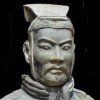The greatest thing in the world is to know how to belong to oneself.
[La plus grande chose du monde c’est de sçavoir estre à soy.]
Michel de Montaigne (1533-1592) French essayist
Essays, Book 1, ch. 38 (1.38), “Of Solitude [De la solitude]” (1572) [tr. Frame (1943), 1.39]
(Source)
Present in the 1st (1580) edition.
Some translators use the 1588 sequence of chapters, not the 1595, and so identify this as ch. 39.
(Source (French)). Alternate translations:The greatest thing of the world, is for a man to know how to be his owne.
[tr. Florio (1603)]The greatest thing in the world is for a person to know that he is his own master.
[tr. Cotton (1686)]The greatest thing in the world is for a man to know that he is his own.
[tr. Cotton/Hazlitt (1877)]The greatest thing in the world is to know how to belong to oneself.
[tr. Ives (1925), 1.39]The greatest thing in the world is to know how to be oneself.
[ed. Rat (1958), 1.39]The greatest thing in the world is to know how to live to yourself
[tr. Screech (1987)]The greatest thing in the world is to know how to belong to oneself.
[tr. Atkinson/Sices (2012)]
Quotations about:
self-knowledge
Note not all quotations have been tagged, so Search may find additional quotes on this topic.
Dig within. There lies the well-spring of good: ever dig, and it will ever flow.
[Ἔνδον σκάπτε, ἔνδον ἡ πηγὴ τοῦ ἀγαθοῦ καὶ ἀεὶ ἀναβλύειν δυναμένη, ἐὰν ἀεὶ σκάπτῃς.]
Marcus Aurelius (AD 121-180) Roman emperor (161-180), Stoic philosopher
Meditations [To Himself; Τὰ εἰς ἑαυτόν], Book 7, ch. 59 (7.59) (AD 161-180) [tr. Staniforth (1964)]
(Source)
On how to turn accidents and misfortune into learning experiences and behavior he will approve of in himself.
(Source (Greek)). Alternate translations:Look within; within is the fountain of all good. Such a fountain, where springing waters can never fail, so thou dig still deeper and deeper.
[tr. Casaubon (1634), 7.31]Look Inwards, and turn over your self; For you have a lasting Mine of Happiness at home, if you will but Dig for't.
[tr. Collier (1701), 7.60]Look inwards; within is the fountain of good; which is ever springing up, if you be always digging in it.
[tr. Hutcheson/Moor (1742)]Look into your own bosom; for you have there a fountain of happiness, if you will searcyh for it, and suffer it to flow without interruption.
[tr. Graves (1792), 7.52]Look within. Within is the fountain of good, and it will ever bubble up, if thou wilt ever dig.
[tr. Long (1862)]Look inwards, for you have a lasting fountain of happiness at home that will always bubble up if you will but dig for it.
[tr. Collier/Zimmern (1887)]Dig within. Within is the fountain of good; ever dig, and it will ever well forth water.
[tr. Rendall (1898)]Look inward. Within is the fountain of Good. Dig constantly and it will ever well forth.
[tr. Hutcheson/Chrystal (1902)]Look within. Within is the fountain of Good, ready always to well forth if thou wilt always delve.
[tr. Haines (Loeb) (1916)]Delve within; within is the fountain of good, and it is always ready to bubble up, if you always delve.
[tr. Farquharson (1944)]Dig within; for within you lies the fountain of good, and it can always be gushing forth if only you always dig.
[tr. Hard (1997 ed.)]Dig deep; the water -- goodness -- is down there. And as long as you keep digging, it will keep bubbling up.
[tr. Hays (2003)]Dig inside yourself. Inside there is a spring of goodness ready to gush at any moment, if you keep digging.
[tr. Hammond (2006)]Turn your attention within, for the fountain of all that is good lies within, and it is always ready to pour forth, if you continually delve in.
[tr. Needleman/Piazza (2008)]Dig within; for within you lies the fountain of good, and it can always be gushing forth if only you always dig.
[tr. Hard (2011 ed.)]Search inside yourself; inside you is the fountain of goodness, and it continues to surge as long as you search.
[ed. Taplin (2016)]
He that has never known adversity is but half acquainted with others, or with himself. Constant success shows us but one side of the world. For, as it surrounds us with friends, who will tell us only our merits, so it silences those enemies from whom alone we can learn our defects.
Charles Caleb "C. C." Colton (1780-1832) English cleric, writer, aphorist
Lacon: Or, Many Things in Few Words, Vol. 1, § 513 (1820)
(Source)
The man who don’t kno himself iz a poor judge ov the other phellow.
[The man who doesn’t know himself is a poor judge of the other fellow.]
Josh Billings (1818-1885) American humorist, aphorist [pseud. of Henry Wheeler Shaw]
Everybody’s Friend, Or; Josh Billing’s Encyclopedia and Proverbial Philosophy of Wit and Humor, “Plum Pits” (1874)
(Source)
Sport strips away personality, letting the white bone of character shine through. Sport gives players an opportunity to know and test themselves.
“Those who fought know a secret about themselves, and it is not very nice.” They have experienced secretly and privately their natural human impulse toward sadism and brutality. […] Not merely did I learn to kill with a noose of piano wire put around somebody’s neck from behind, but I learned to enjoy the prospect of killing that way. It’s those things that you learn about yourself that you never forget. You learn that you have much wider dimensions than you had imagined before you had to fight a war. That’s salutary. It’s well to know exactly who you are so you can conduct the rest of your life properly.
Paul Fussell (1924-2012) American cultural and literary historian, author, academic
“The Initial Shock,” Interview by Sheldon Hackney, Humanities (Nov/Dec 1996)
(Source)
It is a sad fate for a man to die
Too well known to everybody else,
And still unknown to himself.[Illi mors gravis incubate
Qui notus nimis omnibus
Ignotus moritur sibi.]
Self-correction begins with self-knowledge.
[Principio es de corregirse el conocerse]
Baltasar Gracián y Morales (1601-1658) Spanish Jesuit priest, writer, philosopher
The Art of Worldly Wisdom [Oráculo Manual y Arte de Prudencia], § 69 (1647) [tr. Maurer (1992)]
(Source)
(Source (Spanish)). Alternate translations:The knowledge of one's self is the beginning of amendment.
[Flesher ed. (1685)]Self-knowledge is the beginning of self-improvement.
[tr. Jacobs (1892)]It is a first principle that in order to improve yourself, you must first know yourself.
[tr. Fischer (1937)]
No Man is the worse for knowing the worst of himself.
Thomas Fuller (1654-1734) English physician, preacher, aphorist, writer
Gnomologia: Adages and Proverbs (compiler), # 3601 (1732)
(Source)
Know the enemy, know yourself; in a hundred battles you will not be in peril.
Sun-Tzu (fl. 6th C. AD) Chinese general and philosopher [a.k.a. Sun Wu]
The Art of War, “Offensive Strategy” (31) [tr. S. Griffith (1963)]
Alt trans:
- "It is said that if you know your enemies and know yourself, you will not be imperiled in a hundred battles; if you do not know your enemies but do know yourself, you will win one and lose one; if you do not know your enemies nor yourself, you will be imperiled in every single battle." [cited ch. 3, last sentence.]
- "If you know others and know yourself, you will not be imperiled in a hundred battles; if you do not know others but know yourself, you win one and lose one; if you do not know others and do not know yourself, you will be imperiled in every single battle."
- "Know your enemy and know yourself, find naught in fear for 100 battles. Know yourself but not your enemy, find level of loss and victory. Know thy enemy but not yourself, wallow in defeat every time."
- "If you know the enemy and know yourself, you need not fear the result of a hundred battles. If you know yourself but not the enemy, for every victory gained you will also suffer a defeat. If you know neither the enemy nor yourself, you will succumb in every battle."
- Literal translation: "Know [the] other, know [the] self, hundred battles without danger; not knowing [the] other but know [the] self, one win one loss; not knowing [the] other, not knowing [the] self, every battle must [be] lost."
Those who know their own minds do not always know their own hearts.
[Tous ceux qui connaissent leur esprit ne connaissent pas leur coeur.]
François VI, duc de La Rochefoucauld (1613-1680) French epigrammatist, memoirist, noble
Réflexions ou sentences et maximes morales [Reflections; or Sentences and Moral Maxims], ¶103 (1665-1678) [tr. FitzGibbon (1957)]
(Source)
Present in the 1st (1665) edition as "Bien des gens connoissent leur esprit, qui ne connoissent pas leur cœur." In manuscript, given as "On peut connaître son esprit; mais qui peut connoître son cœur?"
(Source (French)). Alternate translations:Many People are Acquainted with their own Wit, that are not Acquainted with their own Heart.
[tr. Stanhope (1694), ¶104]Many People are acquainted with their own Abilities, that are not acquainted with their own Hearts.
[tr. Stanhope (1706), ¶104]Men are sometimes well acquainted with their head, when they are not so with their heart.
[pub. Donaldson (1783), ¶216; ed. Lepoittevin-Lacroix (1797), ¶100]A man may be well acquainted; with his head, whilst he is far from being so with his heart.
[ed. Carvill (1835), ¶188]It is not all who know their heads who know their hearts.
[ed. Gowens (1851), ¶106]Those who know their minds do not necessarily know their hearts.
[tr. Bund/Friswell (1871), ¶103]Those who know their minds best, know their hearts least.
[tr. Heard (1917), ¶103]Not every one who knows his own mind knows his own heart also.
[tr. Stevens (1939), ¶103]Not all those who know their minds know their hearts as well.
[tr. Kronenberger (1959), ¶103]Not everyone who understands his own mind understands his heart.
[tr. Tancock (1959), ¶103]All those who know their minds do not necessarily know their hearts.
[tr. Whichello (2016) ¶103]
The greatest of faults, I should say, is to be conscious of none.
Thomas Carlyle (1795-1881) Scottish essayist and historian
Lecture (1840-05-08), “The Hero as Prophet,” Home House, Portman Square, London
(Source)
The lecture notes were collected by Carlyle into On Heroes, Hero-Worship, & the Heroic in History, Lecture 2 (1841).













